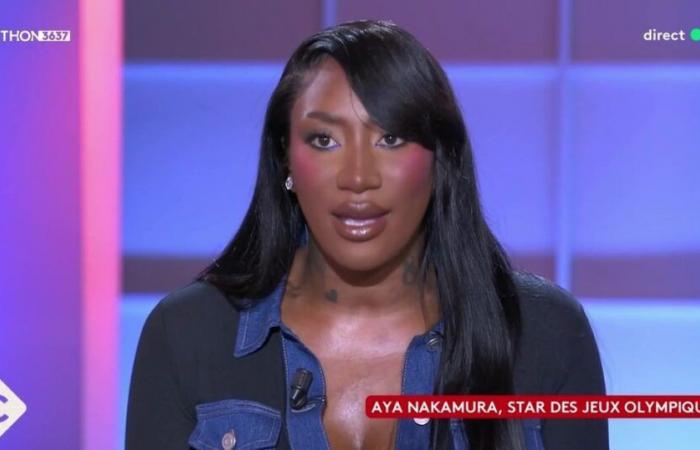
“I'd better go and choose my vocabulary / To please you / In the language of Molière”, sang Aya Nakamura in front of the French Academy. Guest of the show “C à Vous” on France 5 this Thursday, November 28, the singer spoke about the controversies which surrounded her performance during the opening ceremony of the Paris 2024 Olympic Games. A striking performance but tarnished by virulent criticism which affected both the artist and those close to him.
“Something is happening that is extraordinary”
During this opening evening, last July, Aya Nakamura delivered a spectacular show in collaboration with the Republican Guard, in the heart of an emblematic setting: the Institut de France. An exceptional moment which “shut up“, in the words of Anne-Élisabeth Lemoine, to the detractors of the artist, victim of racist and sexist attacks from the extreme right. Questioned by the presenter, the singer returned philosophically to this difficult period : “Yes, of course, I was touched. It's still my passion, we touched on something that makes me vibrate naturally. (…) The first time, as I'm used to criticize, I saw it as another criticism But as soon as I saw my family being affected, I said to myself 'wow'! The support of many artists made me understand that it was a lot. more serious. It's becoming international, it's in the process of becoming. something unusual happens.”
Despite an outpouring of solidarity from several personalities, certain artists did not hesitate to express their frustration at not having been invited to perform during this historic event. Among them, Mr. Pokora and David Guetta stood out for their comments. Although they never questioned the legitimacy of Aya Nakamura, these reactions somewhat disappointed the singer. “I'm still the first from my background to do what I do. I'm starting the ball rolling. You can't arrive like that, being a renoi who comes from Aulnay-sous-Bois, and directly you sing at the Olympics In France, it's every 100 years! she rejoices. “Especially since I saw a lot of artists who wanted to have me as a feat saying: 'I can sing too, I'm legitimate'… It wasn't fair play on their part to say that, especially in these moments- I found it a little disappointing, but I did it anyway, I was the one who sang!” is she having fun. Puremédias invites you to watch the sequence in the video above.
ALSO READ: “As a black artist, I took for everyone”: Aya Nakamura speaks for the first time on the criticism surrounding the opening ceremony of the Olympics
A “failure” of his performance at Vogue World Paris
Aya Nakamura also lifted the veil on a confusion that fueled rumors – and racist attacks – for months regarding her performance at the Paris 2024 Olympic Games. The singer thus revealed that she was indeed supposed to perform “La Vie en Rose” by Edith Piaf in public, but not during the opening ceremony of the Olympic Games. “Basically I had to sing Édith Piaf at that moment. I wasn't supposed to sing it at the Olympics!“, she explained, referring to a performance initially planned for the Vogue World Paris event last June, Place Vendôme. The artist recounted the tense discussions between the Olympic committee and Anna Wintour, emblematic figure of “Vogue”, to determine if she could participate in this event a few weeks before the Games: “I had to be a bit excluded from just doing the Olympics, because it was in Paris. So the Olympics didn't want me to do it. Anna Wintour had to discuss with the Olympics because I had to do it. So I wasn't supposed to do that thing at all.”
Faced with the controversy, the singer finally gave up on covering Édith Piaf during Vogue World Paris, opting for a piece from her own repertoire in order to ease tensions. “I said: 'Well, if I do this thing, I'm not singing Édith Piaf but a piece of my own.' Like that, the Olympic committee was happy“, she explains, regretting “everything (the) is in trouble around that.” Finally, during the Olympic Games, Aya Nakamura surprised and won over the audience with a medley of her hits, including a remarkable cover of “For Me Formidable” by Charles Aznavour. As for Édith Piaf, her equally famous title “L'Hymne à l'amour” was indeed performed but by Céline Dion, in apotheosis on the Eiffel Tower.





